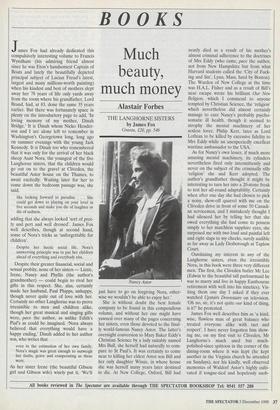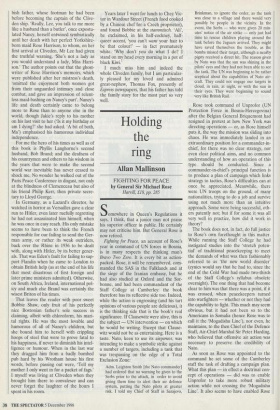BOOKS
Much beauty, much money
Alastair Forbes
THE LANGHORNE SISTERS by James Fox Granta, f20, pp. 546 James Fox had already dedicated this compulsively interesting volume to Francis Wyndham (his admiring friend almost since he was Eton's handsomest Captain of Boats and lately the beautifully depicted principal subject of Lucian Freud's latest, largest and many millions-worth painting) when his kindest and best of mothers slept away her 78 years of life only yards away from the room where his grandfather, Lord Brand, had, at 83, done the same 35 years earlier. But there was fortunately space in plenty on the introductory page to add, 'In loving memory of my mother, Dinah Bridge.' It is Dinah whom Nicko Hender- son and I are alone left to remember in Washington's Georgetown long, long ago on summer evenings with the young Jack Kennedy. It is Dinah too who remembered that it was only for the arrival of her black sheep Aunt Nora, the youngest of the five Langhorne sisters, that the children would go out on to the gravel at Cliveden, the beautiful Astor house on the Thames, to await excitedly. Waiting later for her to come down the bedroom passage was, she said,
like looking forward to paradise . . . She could get down to playing on your level in five seconds and make you die of laughter or die of sadness,
adding that she always looked 'sort of pret- ty and pert and well dressed'. James Fox well describes, though at second hand, some of Nora's tricks as 'unforgettable for children'.
Despite her hectic social life, Nora's unswerving principle was to put her children ahead of everything and everybody else.
Despite their greater financial, social and sexual probity, none of her sisters — Lizzie, Irene, Nancy and Phyllis (the author's grandmother) — could begin to rival her gifts in this respect. She, alas, certainly made her husband, Paul Phipps, unhappy, though never quite out of love with her. Certainly no other Langhorne was to prove irresistible to men and children alike, though her great musical and singing gifts were, pace the author, as unlike Edith's Piaf's as could be imagined. 'Nora always believed that everything would have a happy ending,' Dinah added to her author son, who writes that
even in the estimation of her own family, Nora's magic was great enough to outweigh her faults, grave and exasperating as these were.
As her sister Irene (the beautiful Gibson girl and Gibson wife) wisely put it, 'We'll just have to go on forgiving Nora, other- wise we wouldn't be able to enjoy her.'
She is without doubt the best female company to be found in this compendious volume, and without her one might have yawned over many of the pages concerning her sisters, even those devoted to the final- ly world-famous Nancy Astor. The latter's overnight conversion to Mary Baker Eddy's Christian Science by a lady suitably named Mrs Bull, she herself had naturally to com- pare to St Paul's. It was certainly to come near to killing her eldest Astor son Bill and her only daughter Wissie, in whose house she was herself many years later destined to die. At New College, Oxford, Bill had nearly died as a result of his mother's almost criminal adherence to the doctrines of Mrs Eddy (who came, pace the author, not from New Hampshire but from what Harvard students called the 'City of Fuck- ing and Sin', Lynn, Mass, hard by Boston). The Warden of New College at the time was H.A.L. Fisher and as a result of Bill's near escape wrote his brilliant Our New Religion, which I commend to anyone tempted by Christian Science, the 'religion' which nevertheless did almost certainly manage to cure Nancy's probably psycho- somatic ill health, though it seemed to atrophy the mental machinery of her sexless lover, Philip Kerr, later as Lord Lothian to be killed by excessive fidelity to Mrs Eddy while an unexpectedly excellent wartime ambassador to the USA.
As for Nancy's own lesser, if much more amusing mental machinery, its cylinders nevertheless fired only intermittently and never on the subject of the criminally silly `religion' she and Kerr adopted. The author's grandfather thought it might be interesting to turn her into a 20-stone freak to test her all-round adaptability. Certainly when after one day she had chosen to pick a noisy, show-off quarrel with me on the Cliveden drive in front of some 50 Canadi- an servicemen, and I mistakenly thought I had silenced her by telling her that she owed everything she had come to possess simply to her matchless sapphire eyes, she surprised me with two loud and painful left and right slaps to my cheeks, surely audible as far away as Lady Desborough at Taplow Court.
Outshining my interest in any of the Langhorne sisters, even the irresistible Nora, in this book were three very different men. The first, the Cliveden butler Mr Lee (Edwin to the beautiful tall parlourmaid he was to marry and live in happy Eastbourne retirement with well into his nineties). Vis- iting them one day I asked if they ever watched Upstairs Downstairs on television. `Oh no, sir, it's not quite our kind of thing, is it?' he protested.
James Fox well describes him as 'a kind, wise, flawless man of great balance who treated everyone alike with tact and respect'. I have never forgotten him show- ing me, on my first visit to Cliveden, Mr Langhome's much used but much- polished-since spittoon in the corner of the dining-room where it was kept (he kept another in the Virginia church he attended on Sundays), nor his kindly, well observed memories of Waldorf Astor's highly culti- vated if tongue-tied and hopelessly snob- bish father, whose footman he had been before becoming the captain of the Clive- den ship. 'Really, Lee, you talk to me more like a husband than a butler', once expostu- lated Nancy, herself entwined symbiotically until her death with her perfect Yorkshire- born maid Rose Harrison, to whom, on her first arrival at Cliveden, Mr Lee had given the truthful warning, 'She's not , a lady as you would understand a lady, Miss Harri- son.' The author points out that the ghost- writer of Rose Harrison's memoirs, which were published after her mistress's death, `omitted the enjoyment both women got from their unguarded intimacy and close combat, and gave an impression of relent- less maid-bashing on Nancy's part'. Nancy's life and death certainly came to belong more to Rose than to anyone else in the world, though Jakie's reply to his mother on his last visit to her (Is it my birthday or am I dying?' she had asked. 'A bit of both, Ma') emphasised his humorous individual independence.
For me the hero of his times as well as of this book is Phyllis Langhorne's second husband, Bob Brand; and the deafness of his countrymen and others to his wisdom in the years that were to make the second world war inevitable has never ceased to shock me. No wonder he walked out of the Paris Peace Conference in disgust, not only at the blindness of Clemenceau but also of his friend Philip Kerr, then private secre- tary to Lloyd George.
In Germany, as a Lazard's director, he watched in horror as Versailles gave a clear run to Hitler, even later ruefully regretting he had not assassinated him himself, when he was once in easy reach. His only mistake seems to have been to think the French responsible for our failing to send the Ger- man army, or rather its weak outriders, back over the Rhine in 1936 to be dealt with, along with Hitler, by its better gener- als. That was Eden's fault for failing to sup- port Flandin when he came to London to obtain British help (as at the end of his life that most disastrous of first foreign and later prime ministers admitted). Otherwise, on South Africa, Ireland, international pol- icy and much else Brand was certainly the wisest Briton of his times.
That leaves the reader with poor sweet Bobbie Shaw, only fruit of his perfectly nice Bostonian father's sole success in claiming, albeit with chloroform, his mari- tal rights. He was the most lovable and humorous of all of Nancy's children, but she bound him to herself with crippling hoops of steel that were to prove fatal to his happiness, if never to diminish his intel- ligence or humour. When in the last war they dragged him from a badly bombed pub hard by his Wrotham house his first words, before passing out were, 'Tell my mother I only went in for a packet of fags.' I myself was living at Cliveden when they brought him there to convalesce and can never forget the laughter of the hours I spent in his room. Years later I went for lunch to Chez Vic- tor in Wardour Street (French food cooked by a Chinese chef for a Czech proprietor), and found Bobbie at the stammtisch.
he exclaimed, in his half-cockney, half- queer accent, 'you can't want your hair to be that colour!' — in fact prematurely white. 'Why don't you do what I do? I stand on my head every morning in a pot of black Kiwi.'
I much miss him and indeed the whole Cliveden family, but I am particular- ly pleased for my loved and admired great-nephew, Thomas Fox, presently of Express newspapers, that his father has told the family story for the most part so very well.



















































































 Previous page
Previous page